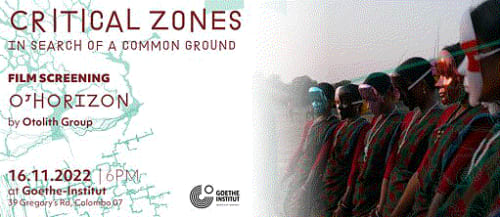The title refers to the surface layer of soil, changed in the area around Santiniketan as the result of Tagore’s introduction of new flora in development of the campus. In studying this trajectory, the film extends The Otolith Group’s ongoing consideration of the Anthropocene, a premise that denotes that the current geological age is one wherein human activity spurs the primary changes on climate and the environment. With O Horizon, The Otolith Group also proposes that Tagore’s project maps onto the notion of terraforming—a term originating in science fiction and now more widely used—whereby a party (typically but not always an interloper) reshapes the atmosphere of a place for their own needs.
O Horizon reflects upon modernist theories of dance and song developed by Tagore and the experimental practices of mural, sculpture, painting, and drawing developed by India’s great modernist artists affiliated with Santiniketan: K.G. Subramanyan, Benode Behari Mukherjee, Nandalal Bose and Ramkinkar Baij. O Horizon draws together visual arts, dance, song, music, and recital to assemble a structure of feeling of the Tagorean imagination in the 21st Century.
Commissioned by Bauhaus Imaginista and co-produced with the Rubin Museum, with kind support of Project 88.
No registration required


